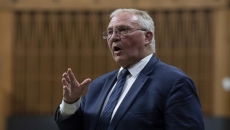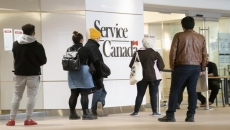Prime Minister Justin Trudeau says the federal government will keep its spending focus on emergency aid and won't talk about hiking long-term health-care funding until after the COVID-19 pandemic is over.
He says Ottawa needs to keep supporting those hit hard financially by the pandemic, having sent billions in aid to businesses and individuals, as well as to provinces.
Speaking at a midday press conference, Trudeau said that short-term outlook can't yet give way to longer-term concerns about the effect COVID-19 is having on the Canada's provincially run health-care systems.
On Thursday, the country's premiers reiterated their demand for a handsome increase in the unconditional transfer payments the federal government sends provinces and territories each year for health care.
But Trudeau held firm on Friday, telling reporters he wouldn't yet negotiate on long-term health care funding.
"As we get through this pandemic, and once we're on the other side, it is obvious that there will be a need for greater financing of health care in this country, including through the Canada Health Transfer," Trudeau said.
"As I've said to premiers, we will be there to increase those transfers. But that conversation needs to happen once we are through this pandemic because right now, the supports we're giving to Canadians are the ones that are needed to get through this pandemic."
We’re giving an update on the current COVID-19 situation, the rollout of vaccines across the country, and the work we’re doing to build a better future for you and your family. Tune in now for the latest: https://t.co/WGaFbE2dpq
— Justin Trudeau (@JustinTrudeau) March 5, 2021
The federal government this year will transfer to the provinces nearly $42 billion for health care, under an arrangement that sees the amount rise by at least three per cent each year.
Premiers argue that amount doesn't keep pace with yearly cost increases of about five per cent, which would mean Ottawa would have to add $28 billion this year to cover just over one-third of national costs, and about $4 billion annually thereafter.
Quebec Premier François Legault, chair of the premiers' council, stressed Thursday that the pandemic-related expenses Ottawa has incurred are one-time costs.
One they roll off, he argued, federal finances could recover over time and end in far better shape over the long run than provinces mired in debt.
In late November, Finance Department officials tried to estimate how much more provinces had spent on health care during the pandemic in a briefing note to Finance Minister Chrystia Freeland.
The figures in the back of the briefing note, obtained by The Canadian Press under the Access to Information Act, suggested the pandemic had by the fall added hundreds of millions in costs for some provinces, subject to a giant asterisk.
Officials cautioned that information on the short-term impacts of the pandemic on health-care spending was "scarce."
The briefing pointed to a study by the Conference Board of Canada that estimated health care costs due to COVID-19 were in a range of $20.1 billion and $26.9 billion in the 2020-2021 fiscal year.
“Longer-term cost projections vary greatly and will depend largely on the evolution of the pandemic and vaccine development and administration,” officials wrote.






